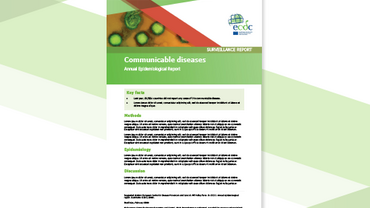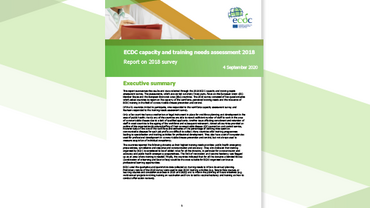Food- and waterborne diseases and zoonoses - Annual epidemiological report 2014 [2012 data]
The Annual Epidemiological Report 2014 gives an overview of the epidemiology of communicable diseases of public health significance in Europe, drawn from surveillance information on the 52 communicable diseases and health issues for which surveillance is mandatory in the European Union and European Economic Area countries.
In order to facilitate more timely publication, this year’s edition of the Annual Epidemiological Report is being first published a disease group at a time and will later be compiled into one comprehensive report. This report presents the epidemiological situation for food- and waterborne diseases and zoonoses as of 2012 and describes the statistical and epidemiological methods used.
Produced annually, the report is intended for policymakers and health sector leaders, epidemiologists, scientists and the wider public. It is hoped that readers will find it a useful overview and reference to better understand the present situation in relation to communicable diseases in Europe. It should also usefully assist policymakers and health leaders in making evidence-based decisions to plan and improve programmes, services and interventions for preventing, managing and treating these diseases.
Executive summary
- Campylobacter cases increased in the five-year period between 2008 and 2012 but decreased slightly in 2012. Human campylobacteriosis has remained the most commonly reported gastrointestinal disease in Europe since 2005. Handling, preparation and consumption of broiler meat has been estimated to account for 20%–41% of human campylobacteriosis cases.
- Salmonellosis rates continued to decrease with a significant five-year decreasing trend in the EU and decreasing trends in 17 EU/EEA countries. This decrease is mainly attributed to the implementation of successful veterinary control programmes, particularly in poultry. However, salmonellosis is the second most commonly reported gastrointestinal infection and an important cause of foodborne outbreaks in the EU/EEA. The five most commonly reported serotypes were S. Enteritidis, S. Typhimurium, monophasic S. Typhimurium, S. Infantis, and S. Stanley. The increase in S. Stanley was due to the multi-country outbreak related to distribution of contaminated turkey meat.
- The case rate of hepatitis A varies greatly across the EU/EEA; with the most affected region being Eastern Europe. Poor water supply and weak infrastructure are associated with virus spread in Eastern European countries and the Balkan region. On the contrary, food-borne hepatitis A transmission has caused three independent multi-country outbreaks in the EU/EEA. In all instances, frozen and fresh berries have been implicated as the vehicle of the infection, raising concerns on food safety and traceability of berry trade within the EU/EEA.
- In 2012, the confirmed STEC/VTEC cases decreased by 66% after the large STEC/VTEC O104:H4 outbreak in Germany in 2011, but increased by 36% compared with years 2009 and 2010.The number of reported confirmed STEC/VTEC cases was 5 748 and the overall notification rate was 1.5 cases per 100 000 population in the EU and EEA countries in 2012.
Download
Publication data
Data
Number and rates of confirmed anthrax reported cases, EU/EEA, 2008–2012
Downloadable Excel table: Number and rates of confirmed anthrax reported cases, EU/EEA, 2008–2012
Data
Distribution of confirmed anthrax reported cases by month, EU/EEA, 2008–2012
Downloadable image: Distribution of confirmed anthrax reported cases by month, EU/EEA, 2008–2012
Data
Number and rates of confirmed botulism reported cases, EU/EEA, 2008–2012
Downloadable Excel table: Number and rates of confirmed botulism reported cases, EU/EEA, 2008–2012
Data
Distribution of confirmed botulism reported cases by month, EU/EEA, 2008–2012
Downloadable image: Distribution of confirmed botulism reported cases by month, EU/EEA, 2008–2012
Data
Number and rates of confirmed brucellosis reported cases, EU/EEA, 2008–2012
Downloadable Excel table: Number and rates of confirmed brucellosis reported cases, EU/EEA, 2008–2012
Data
Distribution of confirmed brucellosis reported cases by month, EU/EEA, 2008–2012
Downloadable image: Distribution of confirmed brucellosis reported cases by month, EU/EEA, 2008–2012
Data
Number and rates of confirmed campylobacteriosis reported cases, EU/EEA, 2008–2012
Downloadable Excel table: Number and rates of confirmed campylobacteriosis reported cases, EU/EEA, 2008–2012
Data
Distribution of confirmed campylobacteriosis reported cases by month, EU/EEA, 2008–2012
Downloadable image: Distribution of confirmed campylobacteriosis reported cases by month, EU/EEA, 2008–2012
Data
Numbers and rates of confirmed cholera reported cases, EU/EEA, 2008–2012
Downloadable Excel table: Numbers and rates of confirmed cholera reported cases, EU/EEA, 2008–2012
Data
Distribution of confirmed cholera reported cases by month, EU/EEA, 2008–2012
Downloadable image: Distribution of confirmed cholera reported cases by month, EU/EEA, 2008–2012
Data
Number and rates of confirmed cryptosporidiosis reported cases, EU/EEA, 2008–2012
Downloadable Excel table: Number and rates of confirmed cryptosporidiosis reported cases, EU/EEA, 2008–2012
Data
Distribution of confirmed cryptosporidiosis reported cases by month, EU/EEA, 2008–2012
Downloadable image: Distribution of confirmed cryptosporidiosis reported cases by month, EU/EEA, 2008–2012
Data
Number and rates of confirmed echinococcosis reported cases, EU/EEA, 2008–2012
Downloadable Excel table: Number and rates of confirmed echinococcosis reported cases, EU/EEA, 2008–2012
Data
Distribution of confirmed echinococcosis reported cases by month, EU/EEA, 2008–2012
Downloadable image: Distribution of confirmed echinococcosis reported cases by month, EU/EEA, 2008–2012
Data
Number and rates of confirmed giardiasis reported cases, EU/EEA, 2008–2012
Downloadable Excel table: Number and rates of confirmed giardiasis reported cases, EU/EEA, 2008–2012
Data
Distribution of confirmed giardiasis reported cases by month, EU/EEA, 2008–2012
Downloadable image: Distribution of confirmed giardiasis reported cases by month, EU/EEA, 2008–2012
Data
Number and rates of confirmed hepatitis A reported cases, EU/EEA, 2008–2012
Downloadable Excel table: Number and rates of confirmed hepatitis A reported cases, EU/EEA, 2008–2012
Data
Distribution of confirmed hepatitis A reported cases by month, EU/EEA, 2008–2012
Downloadable image: Distribution of confirmed hepatitis A reported cases by month, EU/EEA, 2008–2012
Data
Number and rates of confirmed leptospirosis reported cases, EU/EEA, 2008–2012
Downloadable Excel table: Number and rates of confirmed leptospirosis reported cases, EU/EEA, 2008–2012
Data
Distribution of confirmed leptospirosis reported cases by month, EU/EEA, 2008–2012
Downloadable image: Distribution of confirmed leptospirosis reported cases by month, EU/EEA, 2008–2012
Data
Number and rates of confirmed listeriosis reported cases, EU/EEA, 2008–2012
Downloadable Excel table: Number and rates of confirmed listeriosis reported cases, EU/EEA, 2008–2012
Data
Distribution of confirmed listeriosis reported cases by month, EU/EEA, 2008–2012
Downloadable image: Distribution of confirmed listeriosis reported cases by month, EU/EEA, 2008–2012
Data
Number and rates of confirmed salmonellosis reported cases, EU/EEA, 2008-2012
Downloadable Excel table: Number and rates of confirmed salmonellosis reported cases, EU/EEA, 2008-2012
Data
Distribution of confirmed salmonellosis reported cases by month, EU/EEA, 2008–2012
Downloadable image: Distribution of confirmed salmonellosis reported cases by month, EU/EEA, 2008–2012
Data
Number and rates of confirmed shigellosis reported cases, EU/EEA, 2008–2012
Downloadable Excel file: Number and rates of confirmed shigellosis reported cases, EU/EEA, 2008–2012
Data
Distribution of confirmed shigellosis reported cases by month, EU/EEA, 2008–2012
Downoadable image: Distribution of confirmed shigellosis reported cases by month, EU/EEA, 2008–2012
Data
Number and rates of confirmed STEC/VTEC reported cases, EU/EEA, 2008–2012
Downloadable Excel table: Number and rates of confirmed STEC/VTEC reported cases, EU/EEA, 2008–2012
Data
Distribution of confirmed STEC/VTEC reported cases by month, EU/EEA, 2008–2012
Downloadable image: Distribution of confirmed STEC/VTEC reported cases by month, EU/EEA, 2008–2012
Data
Number and rates of confirmed congenital toxoplasmosis reported cases, EU/EEA, 2008–2012
Downloadable Excel table: Number and rates of confirmed congenital toxoplasmosis reported cases, EU/EEA, 2008–2012
Data
Distribution of confirmed toxoplasmosis reported cases by month, EU/EEA, 2008–2012
Downloadable image: Distribution of confirmed toxoplasmosis reported cases by month, EU/EEA, 2008–2012
Data
Number and rates of confirmed trichinellosis reported cases, EU/EEA, 2008-2012
Downloadable Excel table: Number and rates of confirmed trichinellosis reported cases, EU/EEA, 2008-2012
Data
Distribution of confirmed trichinellosis reported cases by month, EU/EEA, 2008–2012
Downloadable image: Distribution of confirmed trichinellosis reported cases by month, EU/EEA, 2008–2012
Data
Number and rates of confirmed tularaemia reported cases, EU/EEA, 2008–2012
Downloadable Excel table: Number and rates of confirmed tularaemia reported cases, EU/EEA, 2008–2012
Data
Distribution of confirmed tularaemia reported cases by month, EU/EEA, 2008–2012
Downloadable image: Distribution of confirmed tularaemia reported cases by month, EU/EEA, 2008–2012
Data
Number and rates of confirmed typhoid/paratyphoid fever reported cases, EU/EEA, 2008–2012
Downloadable Excel table: Number and rates of confirmed typhoid/paratyphoid fever reported cases, EU/EEA, 2008–2012
Data
Distribution of confirmed typhoid/paratyphoid fever reported cases by month, EU/EEA, 2008–2012
Downloadable image: Distribution of confirmed typhoid/paratyphoid fever reported cases by month, EU/EEA, 2008–2012
Data
Number and rates of confirmed yersiniosis reported cases, EU/EEA, 2008–2012
Downloadable Excel table: Number and rates of confirmed yersiniosis reported cases, EU/EEA, 2008–2012
Data
Distribution of confirmed yersiniosis reported cases by month, EU/EEA, 2008–2012
Downloadable image: Distribution of confirmed yersiniosis reported cases by month, EU/EEA, 2008–2012






